- Home
- Peter Benchley
The Deep Page 9
The Deep Read online
Page 9
“We’ll find it. You go ahead ”
Treece looked at Gail. He paused, apparently considering his words. “You’ll stay at the hotel tonight?”
“I guess so,” she said. “Why?”
“Do. And keep your door locked. I don’t want to scare you, but Cloche is sure to know you’re there.”
Gail remembered the sight of the motorbikes that morning. “I know.”
Treece started the car, waited for a taxicab to pass, then made a U-turn on the narrow road and chugged off toward St. David’s.
After the car had disappeared from view, Coffin stared down the empty road. The Sanderses mounted their motorbikes and put on their helmets.
“Good-by, Mr. Coffin,” Gail said.
Coffin did not respond. “I knew him when he was a boy,” he said. “A fine lad.”
Gail and David looked at each other. “I’m sure,” she said. “He seems to be a fine man.”
“Aye. Straight as God Himself. He deserves better.”
“Better than what?”
“Loneliness. Sadness. It’s one thing for old croaks like me. We’re supposed to be lonely. But a young fella like him—it ain’t right. He should have sons to pass along what he knows.”
Sanders said, “Maybe he likes living alone.”
Coffin looked at Sanders. His eyes were cicatrices in his bony head. “Likes it, huh?” he said sharply. “Likes it, does he? A lot you know.” He turned away.
David and Gail watched Coffin walk up the hill into his house.
Sanders said, “What did I say?”
“I don’t know. But whatever it was wasn’t the right thing.”
Sanders looked at his watch. “Let’s go. I’ve got to get all the way back to St. David’s before dark.”
C H A P T E R
V I
The moon had risen well above the horizon, casting an avenue of gold across the still water.
Treece’s boat was forty-three feet long, a wooden craft with the name Corsair painted on the stern. Standing next to Treece at the wheel, Sanders looked aft. The hull, he guessed, had once been a standard-design fishing boat, but by now Treece had so radically altered it to fit his peculiar needs that it looked eccentric. There were winches on both sides of the cabin, racks for scuba tanks along the gunwales, and, where a fighting chair would be bolted to the deck, an air compressor. An aluminum tube, perhaps twelve feet long and four inches in diameter, was lashed to the starboard gunwale. The lamp in the barnacle threw a faint yellow glow on Treece’s face.
Sanders said, “There are so many stars up there, I can’t pick out St. David’s light.”
“Only one that winks regular,” said Treece.
The sea was flat calm, and the lights on shore, a mile away, were passing with mechanical smoothness.
“All the lights look the same,” Sanders said. “How can you tell where you are?”
“Habit. Once you know the shore line, you can tell by the way lights are clustered. Things like Orange Grove and Coral Beach stick out. You’ll see.”
“How do you avoid the reefs in the dark? You can’t see the rocks.”
“A night like this is a bit sticky. There’s not enough breeze to raise many breakers. You pick your way through.” Treece smiled. “After you make a couple of mistakes, you recess your prop in the hull and put a pair of steel skegs along the bottom so when you hit a rock you get a noisy bong that tells you to back off.”
Sanders heard a whine from the bow. He looked through the windshield and saw Charlotte crouched on the pulpit that extended out from the bow. Her haunches were quivering, and her tail twitched excitedly.
“What’s her problem?”
“Phosphorescence,” said Treece. “Stick your head over the side.”
Sanders leaned over the starboard gunwale and looked forward. A mantle of tiny yellow-white lights covered the water displaced by the bow of the boat.
“It’s called bioluminescence. The boat disturbs the micro-organisms in the water, and they react by giving off light. Some of them are worms, others are crustaceans. Same as fireflies, basically. The Japs used to rub them on their hands during the war so they could read maps in the jungle at night. Charlotte wants to eat them.”
Sanders said, “She’s got quite an appetite.”
“One day she’ll be lunch herself. A while back, she got all hot over a shark that was cruising about; jumped on the bastard’s back and tried to take a bite out of him.”
“Why didn’t it eat her?”
Treece laughed. “The shark was bloody terrified—not exactly accustomed to having some hairy thing jump on him from above. Took a big shit and zoom!—off he went. He came back ’round by and by, but by then I had the dumb bitch out of the water.”
“Why do you bring her along?”
“She gets lonely if I leave her.” Treece swung the wheel a quarter turn to the left. “Besides, she’s company.”
They fell silent, watching the glassy night water and the twinkling lights on shore. Sanders took a deep breath, exulting in the salty freshness of the air. He could not remember feeling so good, so alive. He felt as if he were living out the dreams of his youth, and, like a child, he was pleased—almost proud—to be alone with Treece. He was mildly ashamed to recognize that he was glad Gail was not with them. This was something special, an experience that would be his alone. He reprimanded himself: Don’t be a middle-aged adolescent. The best reason for not bringing Gail along is that this might be dangerous.
He contemplated the possible perils and, as usual, found himself ambivalent toward them: nervous but excited, afraid of the unknown but impatient to meet it, eager to do things he had never done. As he looked at the dark water, a shiver of anticipation made the hair on his arms rise.
They traveled southwest for another few minutes. “See up ahead,” Treece said, pointing. “That’s Orange Grove. You can tell by the lights: four in a row close together, that’s the dining room. Then a dark spot for the kitchen, then a long thin one—the picture window in the bar.”
“What do you do on a foggy night?”
“Stay home.”
Treece kept the boat at three-quarters throttle until they were directly off the Orange Grove lights. Then he turned toward shore and slowed to a speed just above idle. He peered through the cabin window at the water ahead. “Could use a bit of wind,” he said, “and a bit of cloud cover, too. In that moonlight, we’re going to stick out like the cherry on a cream pie.”
“How much do you draw?”
“Three feet. We should get through with nothing more than a scratch or two.”
“Will I be in your way if I go up forward?”
“No. Sing out if you see anything that wants to dent us.”
Sanders walked to the bow. The dog was still blocking the way to the pulpit, and Sanders nudged her aside and went to the end of the pulpit. The bow cut through the water with a sshhhh noise that, from where Sanders stood, was as audible as the low chug of the engine. Sanders looked at the streak of moonlight ahead. Something broke water—a flash of silver crossed the moonlight and splashed into the dark. Sanders looked back at Treece, who said, “Barracuda.”
They crossed the first line of rocks, and the second. Twenty or thirty yards in front of the boat, Sanders saw rings of water spreading away from a center, as if some unseen hand had thrown a stone from above. “What’s that?” he said.
Treece raised up on tiptoes. “Bejesus!” he said, and he swung the wheel hard left. “That bastard would’ve stove us clean.”
“Reef?”
“Aye. We’re in the third line now.” Treece aimed the bow toward shore and turned off the engine. The boat continued to drift, then finally settled, nearly motionless. Treece jumped up onto the gunwale and walked forward. “No wind, no tide, no nothing. One hook should keep us here.” He threw an anchor overboard and let the line run through his hands until it fell slack. He tugged it twice, securing the anchor in the coral, and tied it to a forward cleat. �
��Let’s get dressed.”
Followed by the dog, they went aft into the cockpit. As Sanders attached his regulator to the neck of the scuba tank—holding the regulator up to the moon, to make sure he wasn’t putting it on backward—Treece went below. He threw two black neoprene wet suits—boots, trousers, jackets, hoods—through the hatch onto the deck.
“Is the water that cold?” Sanders asked.
“No, but the rocks’ll flay you at night. Brush up against something you can’t see, it’ll give you the chills.” Treece ducked below again, and returned, carrying in one hand a metal strongbox, in the other a large battery-powered light in an underwater housing. He showed Sanders the on-off switch on the light and said, “We won’t use it any more than we have to. It’s a bloody beacon down there.”
“How will we see?”
“I’ll see,” Treece said, pointing to the strongbox. “You stick next to me.” He opened the box. Inside, cushioned with rubber, were a mask and a pistol-grip flashlight. “Infrared stuff. So I can find the rock you left.”
When they were dressed, they sat on the starboard gunwale. “Look at your watch,” Treece said. “After half an hour, you come up, no matter how much air you’ve got left. Don’t want to run out of breeze at night. There may be a current down there, and it’s no fun to swim five hundred yards back sucking a dry tank.” Treece reached beneath the gunwale, found a Ping-Pong paddle, and tucked it in his weight belt. The dog wagged her tail and sniffed at Treece’s flippers. “Guard the boat, Charlotte,” he said.
He looked at Sanders. “Set? We’ll go down together. When we hit bottom, turn on the light and have a quick look-around. Make it as short as possible. Soon as you see something familiar, so you know where we are, turn off the light and head for it. If I’m lucky with this”—he held up the infrared light—“we won’t have to use that light too much.”
“What makes you think anybody’ll come out after us?”
“Chances are, nobody will. But there’s no sense issuing engraved invitations.”
Treece put in his mouthpiece and made a thumbs-up sign. Sanders answered with the same sign, and they rolled backward into the water.
Beneath the surface was utter darkness. More than an absence of light—it was a thick, enveloping black, a positive nothingness. Sanders’ eyes were open, but they did not see—not his bubbles as he breathed, nor the rim around the faceplate of his mask, nor a finger held an inch in front of his face. For a second, he believed he had suddenly been struck blind. Water washed around his nose. He tilted his head to clear his mask, feeling for the top of the faceplate, pressing hard with his fingers, exhaling through his nose, and he saw undulating pinpoints of light—starlight refracted by the water.
As he exhaled and his lungs emptied, Sanders began to sink toward the bottom. He took a breath, and his descent slowed. The water, chilly at first, was warming to body temperature inside his wet suit. He felt warm and helpless and peaceful, as if he were revisiting the womb. He spread his arms and let himself glide softly to the bottom.
His flippers touched sand. There was a gentle current, enough to make standing difficult, so he dropped to his knees. The light hung around his wrist by a rubber thong. He felt for the on-off switch and pushed it with his thumb. A cylinder of yellow stabbed through the black.
Sanders had no idea where he was or which way he was facing. He swung the light left and right over the sand and rocks and was startled by the brilliance of the colors brought out by the incandescent beam. By day, the sand had looked pale blue-gray, the rocks blue-brown, the fish blue-green. But the flashlight brought out the natural colors. He saw the whites and reds and oranges of the coral, the power-pink belly of a slumbering parrot fish. The light hit a line of brown, covered by green, and Sanders recognized it as one of the timbers from the wreck. The head of a small barracuda appeared at the edge of the beam of light. It lingered for only a moment. Sanders looked around. Outside the narrow shaft of yellow, all was black. He wondered if sharks were attracted by light.
Something touched his shoulder. He jerked backward in spasmodic shock and felt fingers tapping him. Then he saw the black figure of Treece move into the beam of light. Treece gestured for Sanders to turn off the light and follow him; he held out his hand. Sanders took the hand, turned off the light, and when he felt a slight tug, began to kick alongside Treece.
Still he saw only black. Without Treece’s special mask, the infrared light was invisible. Sanders assumed that Treece was homing in on the cave, for there was no hesitation to his movement: he was swimming fast, in what felt like a relatively straight line.
Treece slowed, then stopped. With his hand, he guided Sanders to a spot on the bottom. He tapped the light, and Sanders pressed the switch. They were at the mouth of the cave.
The light reflected off the white sand and rock walls. Sanders saw the rock marker they had placed in the cave. Treece’s hand moved it and set it in the sand next to the infrared light. A finger pointed to the depression in the sand where the rock had been, telling Sanders to train the light there. The finger withdrew, and a hand appeared, holding the Ping-Pong paddle. Treece moved the paddle over the sand in short, swift motions. The sand rose in billows: in seconds, the cave was filled with a cloud. Sanders put his face down beside the light. The hole in the sand grew. It was several inches deep, more than a foot in diameter. Treece brought his face down beside Sanders’, and the two heads clustered about the light as the paddle waved the sand away.
Treece stopped fanning. At first, Sanders thought he had given up. Then he saw two fingers reach into the sand hole and withdraw, clutching what looked to Sanders like a brown leaf. There was a faint impression on the leaf, traces of writing or printing. The fanning resumed, and Sanders saw a glint in the sand. The fingers probed again, as delicately as if they were extracting a splinter from a child’s foot. An ampule was pulled from the sand.
Soon more leaf appeared—rotten wood, Sanders now assumed, from the cigar boxes that held the ampules; and then another ampule. Then two ampules together. Then, as the hole deepened, the corner of a box, faded and flaking. Sanders backed off a few inches, for most of the box seemed to lie outside the cave. Treece fanned until he had uncovered the box. It lay upside down, a brown square about six inches by eight. He set the paddle down and gently lifted the box bottom, which came away in one mushy piece. Inside, protected by a honeycomb of cardboard partitions, lay forty-eight ampules, all intact.
Treece didn’t touch them. He picked up the paddle and began to fan again, moving away from the mouth of the cave. The sand that swirled around the cave was already sifting between the ampules, covering them. Treece fanned until he found the edge of another box, then stopped. He held his left wrist up to the light and rolled back his wet-suit cuff. Sanders saw the dial of his wrist watch: they had been down for thirty-two minutes. Treece’s thumb pointed up, and his hand reached to take the light from Sanders.
Sanders rose slowly in the black water, watching the beam of light below him. It would move a few feet, then stop, then move again. Sanders swam without using his arms, kicking smoothly, making as little commotion as possible, for he suddenly felt lonely and vulnerable in the blackness. His senses were useless, and he did not want to attract the attention of anything equipped to prey upon the weak or solitary.
His head broke the surface. He looked around and saw that he had misjudged his ascent; he had risen away from the boat, not toward it. It rested at anchor, a black sculpture in the moonlight, about fifty yards away. He did not want to swim on the surface, where he would make sounds and vibrations that an animal below might determine were being emitted by a wounded fish. So he ducked underwater and kicked in the general direction of the boat. Twice he poked his head out of water, twice discovered that he had strayed way wide of the boat. Since he could see nothing on the bottom against which to measure his progress, he could not maintain a steady course.
He was breathing too fast, too deeply, his lungs gasping for more air than th
e regulator would give them. Stop it! he told himself. Stop it, or you’ll run out of air. He stopped swimming and lay motionless in the water, forcing himself to breathe more slowly. Gradually, the ache in his lungs subsided. He raised his face from the water, saw the boat, and, with a smooth, deliberate breast stroke, swam toward it.
Sanders reached the boat and held onto the diving platform at the stern that made it possible for divers to board the boat without assistance. He unsnapped his shoulder harness and heaved his tank onto the platform. Then he hauled himself up and sat, breathing heavily, letting his fiippered feet dangle in the water. He heard a distant whining from the direction of the bow.
Treece’s head popped up beside the platform. He spat out his mouthpiece and said, “Where’s Charlotte?”
“Forward. Sounds like she’s having a nightmare.”
“Not bloody likely.” Treece pulled himself, tank and all, onto the platform. With one motion, he shed his tank and stepped over the transom onto the deck. “She doesn’t sleep on the boat. She waits for me, so she can lick the salt off my face.” He started forward, and Sanders followed.
As they neared the bow, the whining grew louder, more frantic. Sanders saw the outline of Treece ahead of him, a wide, towering figure that moved with certainty and grace even in the dark. He saw Treece stop, then heard him cry, “Bastards!”
“What is it?” As he drew even with Treece, Sanders saw the dog.
She had thrust herself against the port gunwale, where she thrashed in a contorted ball, wildly biting at her flanks. Something shiny protruded from her rear end, just above the tail, where the dog couldn’t reach with her teeth. She had tried to get at whatever it was, and in gnashing at her flanks had torn tufts of hair and flesh from her haunches. Exhausted, whining, she continued to snap at herself.
Treece squatted down and put out a hand to soothe the dog. The dog curled her lip and growled. “It’s all right,” Treece said softly. “It’s all right.” He grabbed the dog’s neck and forced her head to the deck. With his other hand, he reached around and yanked a piece of steel from the dog’s back. Freed from pain, the dog moaned and licked herself.

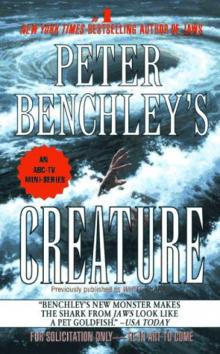 Peter Benchley's Creature
Peter Benchley's Creature The Island
The Island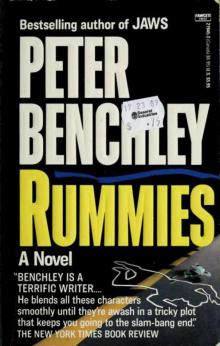 Rummies
Rummies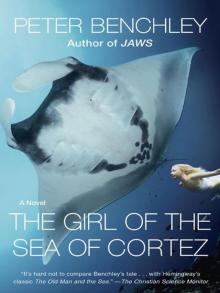 The Girl of the Sea of Cortez: A Novel
The Girl of the Sea of Cortez: A Novel Time and a Ticket
Time and a Ticket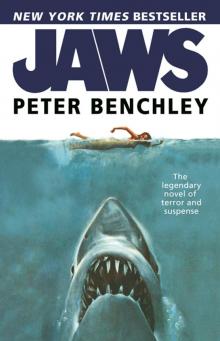 Jaws
Jaws The Deep
The Deep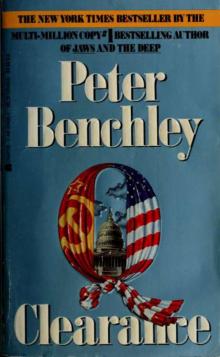 Q Clearance
Q Clearance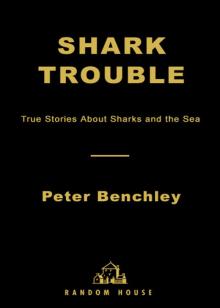 Shark Trouble: True Stories and Lessons About the Sea
Shark Trouble: True Stories and Lessons About the Sea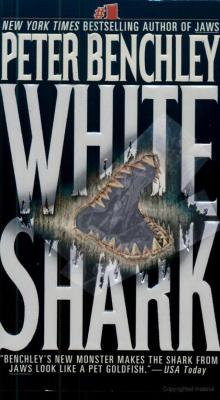 White Shark
White Shark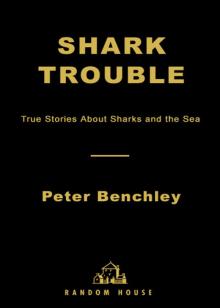 Shark Trouble
Shark Trouble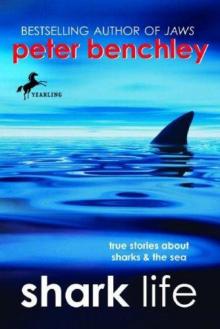 Shark Life: True Stories About Sharks & the Sea
Shark Life: True Stories About Sharks & the Sea